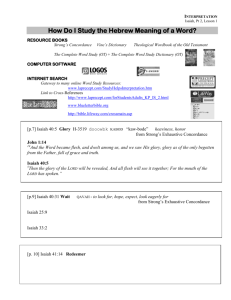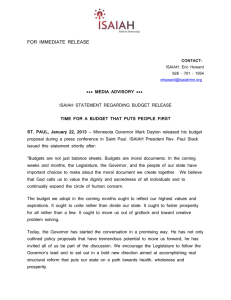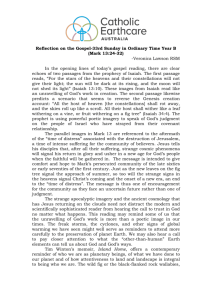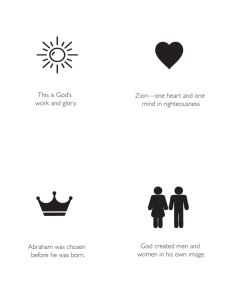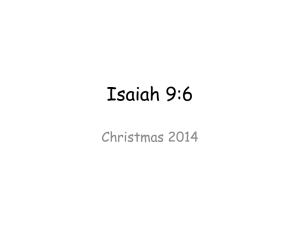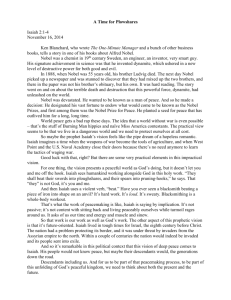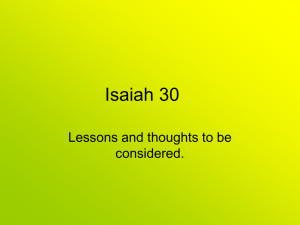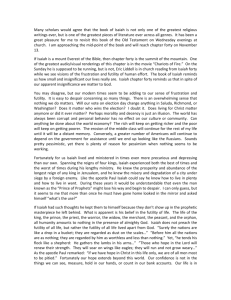Lesson__13_Swords_into_Plowshares
advertisement
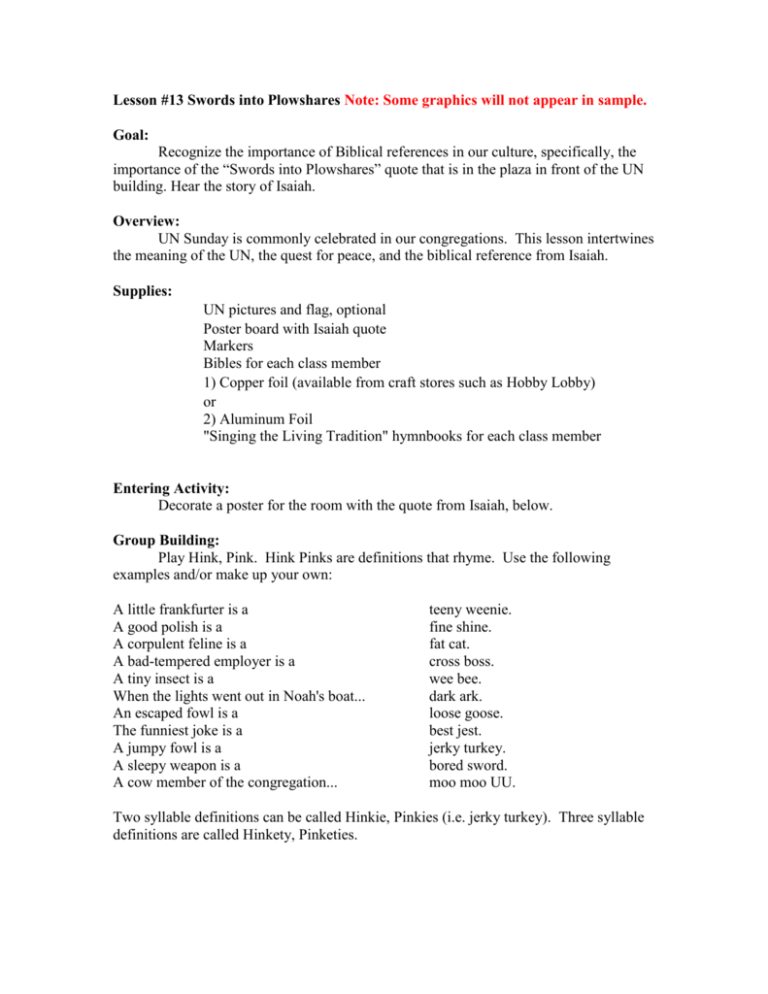
Lesson #13 Swords into Plowshares Note: Some graphics will not appear in sample. Goal: Recognize the importance of Biblical references in our culture, specifically, the importance of the “Swords into Plowshares” quote that is in the plaza in front of the UN building. Hear the story of Isaiah. Overview: UN Sunday is commonly celebrated in our congregations. This lesson intertwines the meaning of the UN, the quest for peace, and the biblical reference from Isaiah. Supplies: UN pictures and flag, optional Poster board with Isaiah quote Markers Bibles for each class member 1) Copper foil (available from craft stores such as Hobby Lobby) or 2) Aluminum Foil "Singing the Living Tradition" hymnbooks for each class member Entering Activity: Decorate a poster for the room with the quote from Isaiah, below. Group Building: Play Hink, Pink. Hink Pinks are definitions that rhyme. Use the following examples and/or make up your own: A little frankfurter is a A good polish is a A corpulent feline is a A bad-tempered employer is a A tiny insect is a When the lights went out in Noah's boat... An escaped fowl is a The funniest joke is a A jumpy fowl is a A sleepy weapon is a A cow member of the congregation... teeny weenie. fine shine. fat cat. cross boss. wee bee. dark ark. loose goose. best jest. jerky turkey. bored sword. moo moo UU. Two syllable definitions can be called Hinkie, Pinkies (i.e. jerky turkey). Three syllable definitions are called Hinkety, Pinketies. Focusing Activity: Display quote and tell them about the statue representing peace, called “Let Us Beat Swords into Plowshares”, that expresses the main goal of the United Nations. The statue is by the Russian sculptor Evgeniy Vuchetich, and was a gift from the former Soviet Union in 1959. The statue represents the figure of a man holding a hammer in one hand and in the other, a sword which he is making into a plowshare. It stands on the grounds of the UN headquarters. ...and they shall beat their swords into plowshares, and their spears into pruning hooks: Nation shall not lift up sword against nation, neither shall they learn war any more. Isaiah 2:4 Focusing Questions for Discussion and Reflection: Look up the quote in a Bible. What does this ancient saying mean to you? Have you ever heard it before? Our Tradition: Note that the Book of Isaiah is near the end of the Jewish Scriptures. The author wrote it 700 years before Jesus lived. Isaiah was a prophet, a person who proclaimed against the present condition of things. The people of Israel were conquered over and over again, and many thousands dragged out of their homeland to become slaves. Isaiah was giving them hope that someday things would be different. The Jewish people lived in exile (away from their homeland) for over 600 years. This hopeless situation was the condition in which Isaiah also talked about the coming of a Messiah to change things. Isaiah’s wish for peace, beating swords into plowshares, is the great hope of the United Nations. The purposes and principles of the UN sound very much like the purposes and principles that our faith believes in. In fact, we have included the charter of the UN in our hymnbook as a reading, #475. Isaiah’s quote still speaks to our hopes today. That is why it is worth knowing the stories in the Bible. Activity: Something like beating swords... Make copper foil images for peace. Use a stylus to draw peace images into the soft copper. Burnish with a little black shoe polish and a soft rag, if desired. or Tear off a 2 foot piece of aluminum foil for each class member. Let them crumple it into a human figure and sculpt it. Integration and Response: Can you make a parallel poem, and think of other images that would suggest peace. i.e. Grow mushrooms in missile silos (this is true, it’s really being done in Kansas!) Make a list of modern images on the poster board with the quote. Closing Worship: Gather in a circle around the chalice. Put your foil figures around the chalice. Read # 589 by the pupils of the Lincoln School in “Singing the Living Tradition”. Use different voices to read each line. Peace Peace means the beginning of a new world. It means that nations are friends; It means joy to the world. Peace is quiet and calm; it is rest; It is silence after a storm. It is love and friendship; It is the world's dream of dreams. Peace brings comfort and happiness; It brings bread to the hungry; It brings prosperity to the nations. It means the strong respect the weak, the great respect the small, the many respect the few. It is like spring after winter; It brings sunshine into the world; It is like sweet music after harsh sounds. PUPILS OF THE LINCOLN SCHOOL (ADAPTED) Snack: Something from a foreign land perhaps? Picture of the UN Statue Background for Teachers: From Oxford Annotated Bible Notes: The prophet Isaiah, the son of Amoz, proclaimed his message to Judah and Jerusalem between 742 and 687 B.C., that critical period in which the Northern Kingdom was annexed to the Assyrian empire while Judah lived in its shadow as a tributary. Nothing is known about the early life of the prophet, although it has been conjectured from certain aspects of his message that he may have been a priest. Summary of Bible Passages: II Kings18-24, II Chronicles, Isaiah; Jeremiah For a time when good King Hezekiah was on the throne in Judah, God did not allow the Assyrians to capture the kingdom. But Hezekiah’s sons and grandsons were not as obedient to God as he, and so God allowed Nebuchadnezzar of Babylon to capture Jerusalem, the capital of Judah, and take tens of thousands of Hebrews as captives. The Hebrews were taken to Babylon, where they became lonely and discouraged. Still, some among them remembered God’s promise to Abraham, Isaac, and Jacob and believed that it would come true. They began dreaming of a time when all wars would cease, when swords would be melted into plows... Many years passed, however, and though some of the Hebrew people were able to return to Jerusalem, still peace did not come. Sometimes the Hebrews were victorious in their battles to keep the city, but on each occasion were eventually defeated. After the Babylonians came the Persians, followed by the Greeks, and then the Romans. For nearly 600 years God’s chosen people were ruled by foreign conquerors. (So this time) ended in much sorrow, but a hope glowed through the sorrow, like a sunbeam shining through a crack in a dark room. - From ‘Growing Up Year’ by Peg Gooding From ‘A Chosen Faith’: In the Bible, when religion is defined, its requirements entail concrete duties, not abstract theological formulations. “What does the Lord require of you,” the prophet Micah asked, “but to do justice, love mercy, and walk humbly with your God.” That is as abstract and theological as it gets. According to Isaiah, our religious charge is even more specific: “to loose the bands of wickedness, to undo the thongs of the yoke, to let the oppressed go free, and to break every yoke... To share your bread with the hungry, and bring the homeless poor into your house; when you see the naked, to cover him... If you pour yourself out for the hungry and satisfy the desire of the afflicted, then shall your light rise in the darkness, and your gloom be as the noonday” (Isa. 58: 6-10) pgs. 125126. Background on the UN from World Book Encyclopedia: The United Nations (UN) is an organization that works for world peace and security and the betterment of humanity. Countries of every part of the world belong to the UN. The UN has two main goals: peace and human dignity. United Nations headquarters consists of several buildings along the East River in New York City. Members of the United Nations have donated many furnishings and works of art for the UN buildings. The flags of all the members fly in front of UN headquarters. The United Nations flag has a map of the world surrounded by a wreath of olive branches. The charter lists four purposes and seven principles of the United nations: To preserve world peace and security. To encourage nations to be just in their actions toward each other. To help nations cooperate in trying to solve their problems. To serve as an agency through which nations can work toward these goals. All members have equal rights. All members are expected to carry out their duties under the charter. They agree to the principle of settling their disputes peacefully. They agree not to use force or the threat of force against other nations, except in selfdefense. They agree to help the UN in every action it takes to carry out the purposes of the charter. The UN agrees to act on the principle that non-member states have the same duties as member states to preserve world peace and security. The UN accepts the principle of not interfering in the actions of a member nation within its own borders. But these actions must not hurt other nations. For more information visit www.un.org
